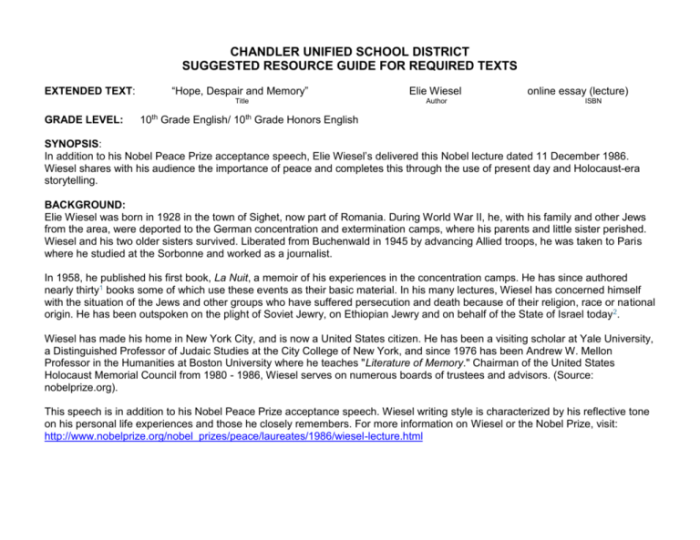Hope despair and memory elie wiesel – Elie Wiesel’s “Hope, Despair, and Memory” offers a profound exploration of the Holocaust through the lens of one survivor’s experiences. Wiesel’s firsthand account provides a gripping and thought-provoking narrative that delves into the complexities of hope and despair amidst unimaginable suffering.
Wiesel’s work not only bears witness to the horrors of the Holocaust but also challenges conventional notions of memory and history. Through his writings, he compels us to confront the darkest chapters of human history and to grapple with the enduring legacy of genocide.
Hope and Despair in Elie Wiesel’s Work

Elie Wiesel’s experiences as a prisoner in Nazi concentration camps profoundly shaped his understanding of hope and despair. He witnessed firsthand the horrors of the Holocaust, and his writing reflects the struggle to maintain hope in the face of such overwhelming suffering.
Wiesel believed that hope was essential for survival, even in the darkest of times. He wrote, “Hope is not the conviction that something will turn out well, but the certainty that something makes sense, regardless of how it turns out.”
However, Wiesel also recognized the dangers of despair. He saw how despair could lead to apathy and resignation. He wrote, “Despair is not the opposite of hope, but its companion.”
Examples of Hope and Despair in Wiesel’s Writings, Hope despair and memory elie wiesel
- In Night, Wiesel describes the prisoners’ struggle to maintain hope in the face of unimaginable suffering. He writes about the prisoners who sang songs and told stories to keep their spirits up. He also writes about the prisoners who lost all hope and died.
- In The Dawn, Wiesel writes about the survivors of the Holocaust who struggle to rebuild their lives. He shows how the survivors are haunted by their memories of the Holocaust, but he also shows how they are able to find hope and meaning in their lives.
Memory and the Holocaust

Elie Wiesel believed that memory was essential for bearing witness to the Holocaust. He wrote, “To forget the Holocaust would be not only a sin of omission but also a betrayal of the dead.”
Wiesel’s work challenges traditional notions of memory and history. He argues that the Holocaust was not simply a historical event, but a crime against humanity that continues to haunt the present. He writes, “The Holocaust is not a memory. It is a wound that will never heal.”
How Wiesel Uses Memory to Bear Witness to the Holocaust
- In Night, Wiesel recounts his experiences as a prisoner in Nazi concentration camps. He writes in a vivid and unflinching style, describing the horrors of the Holocaust in detail.
- In The Trial of God, Wiesel imagines a trial in which the victims of the Holocaust confront God. He uses this literary device to explore the complex questions of faith and guilt that the Holocaust raises.
The Legacy of Elie Wiesel
Elie Wiesel’s work has had a profound impact on Holocaust education and remembrance. He has helped to raise awareness of the Holocaust and its victims, and he has challenged people to confront the darkness that is capable of existing in the human heart.
Wiesel’s work continues to inspire and challenge people today. He is a reminder of the importance of hope, memory, and bearing witness to the suffering of others.
Examples of the Impact of Wiesel’s Work
- Wiesel’s work has been translated into more than 30 languages, and it is taught in schools and universities around the world.
- Wiesel has received numerous awards for his work, including the Nobel Peace Prize in 1986.
- Wiesel has founded several organizations dedicated to Holocaust education and remembrance, including the Elie Wiesel Foundation for Humanity.
FAQ Compilation: Hope Despair And Memory Elie Wiesel
What is the significance of memory in Elie Wiesel’s work?
Memory plays a pivotal role in Wiesel’s writings, serving as a means of bearing witness to the Holocaust and challenging traditional notions of history. By preserving the memory of the victims and the perpetrators, Wiesel aims to prevent the horrors of the past from being forgotten and repeated.
How does Wiesel’s writing style contribute to the impact of his message?
Wiesel’s use of vivid imagery, poetic language, and personal anecdotes creates a powerful and immersive narrative that draws readers into the experiences of the Holocaust survivors. His ability to evoke both the horrors and the humanity of the experience makes his writing both deeply moving and thought-provoking.
What is the legacy of Elie Wiesel’s work?
Elie Wiesel’s work has had a profound impact on Holocaust education and remembrance. His writings have helped to raise awareness about the Holocaust, promote dialogue and understanding, and inspire countless individuals to work towards a more just and compassionate world.